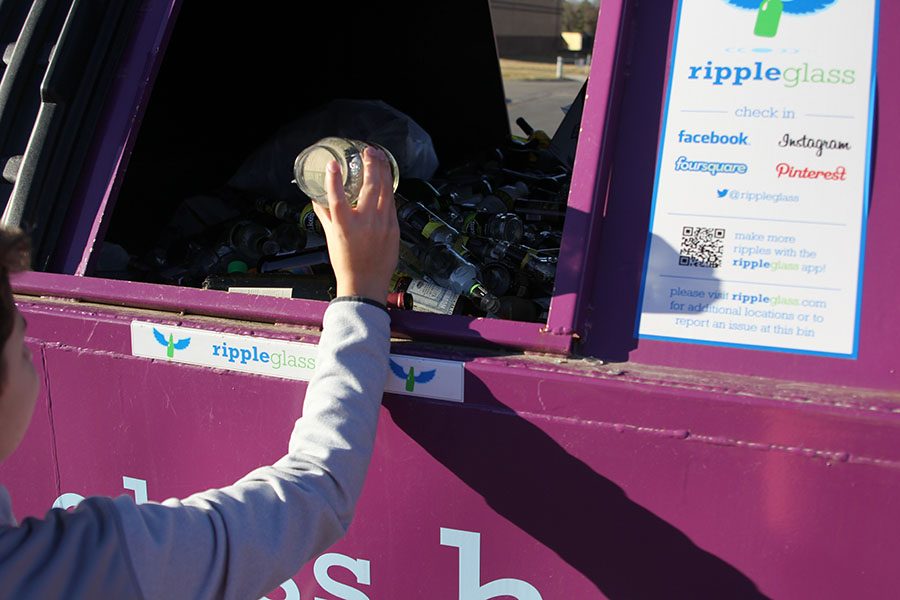As a result of most waste management services in the area not accepting glass, there is a Ripple Glass recycling bin in the Price Chopper parking lot to make recycling glass more efficient.
Students and staff get involved with environmental change
Community evaluates the state of the environment and what they can do to help
March 8, 2017
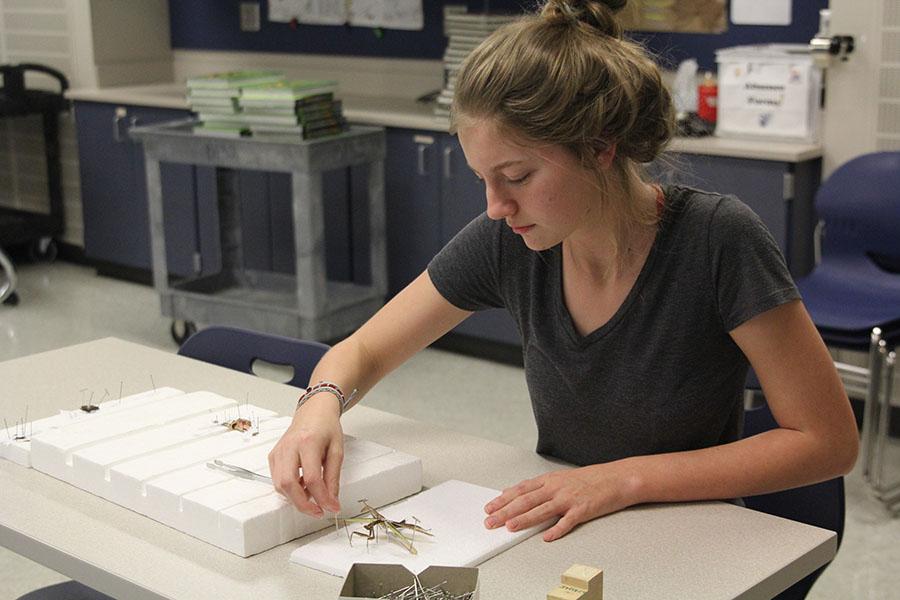
As part of the Plants and the Environment class taught by science teacher Julie Roberts, sophomore Kaylee Cleaver puts pins in the styrofoam board to set the dead insect into place during seminar on Wednesday, Feb. 22.
Education provides pathway to promoting environmental change
Studying the environment provides a way to reduce waste and encourage change
Here at school, there are numerous opportunities to get involved for people who care about the environmental protection. Biology classes usually have an environmental impact unit, but for those who want to delve deeper, Environmental Science is the pathway to learn more.
Environmental Science teacher Julie Roberts teaches what kind of impact humans have on the environment.
“We cover populations and then spend the rest of the class on human impact,” Roberts said, “so for human impact, I separated it out into the atmosphere, land and water and how humans impact those different areas.”
Senior Dalton Bray said his interest in environmental issues encouraged him to explore his higher education options. After high school, Bray plans to attend Northeast Community College in Norfolk, Nebraska where he will participate in a lineman and energy program.
“I want to figure out how energy is distributed among the entire grid and find better ways to conserve energy,” Bray said.
Nearby at the University of Kansas, there are many roads to take when it comes to learning about environmental impact after high school. Dr. Terry Loecke from the Environmental Studies program described how interested students can earn a degree while benefiting the environment they live in.
“Across the university, many faculty have an interest in the environment that finds its way into their courses,” Loecke said via email. “At KU, the Environmental Studies program is an interdisciplinary program and undergraduate program where many of faculty interested in the environment are appointed or affiliated.”
The list of classes available to study just at KU includes everything from Environmental Issues in Africa to the Biology of Fungi. Research opportunities are also emphasized, many of which are 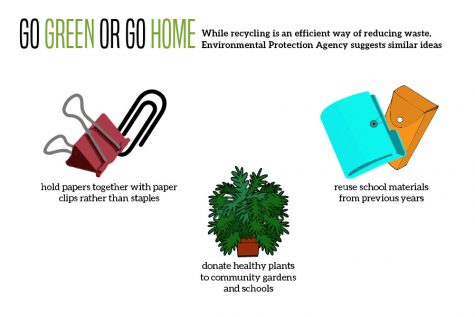 available to undergrads.
available to undergrads.
“As a faculty in the Kansas Biological Survey research unit,” Loecke said, “my colleagues and I focus on how a number of factors [such as] climate and land management within Kansas and beyond, influence water, air and soil quality, wildlife habitat and populations and ecosystem diversity and functioning.”
Not everyone, though, is going to college to major in environmental sciences. Roberts says that simply taking an interest in the subject and educating yourself is important to reducing human impact on the environment.
“I think the biggest thing for most people is understanding their impact,” Roberts said. “The first step is understanding. Once people understand how they’re impacting the planet, they’re willing to make changes.”
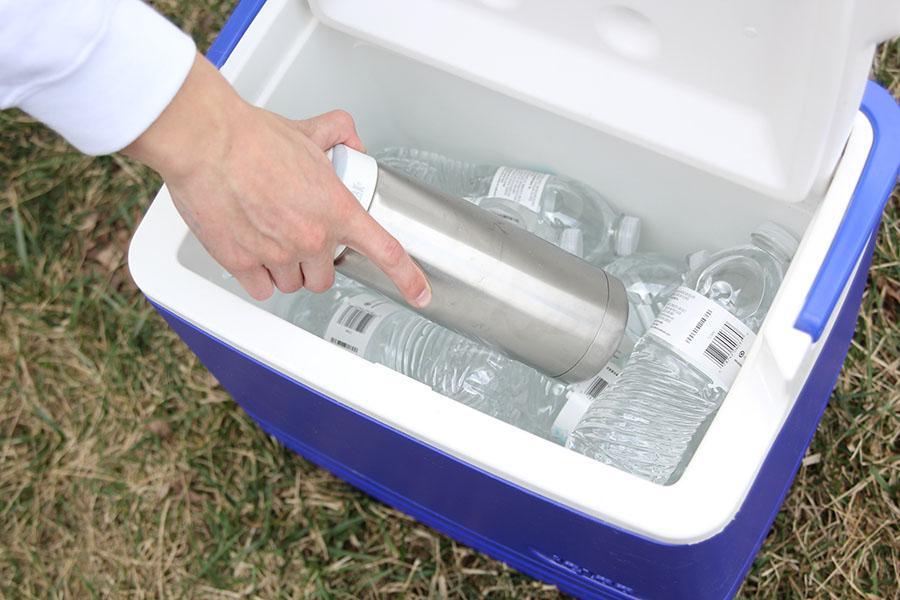
Using reusable water bottles rather than disposable plastic ones is a simple way to eliminate waste.
Students and staff reduce global impact in simple ways
With aid from recycling and other waste-reducing methods, Mill Valley makes positive changes to the environment
Since elementary school the phrase “reduce, reuse, recycle” has been the mantra for saving the planet. For many students, though, it’s hard to figure out how this can be applied. Diving deeper into the meaning of reducing, reusing and recycling involves taking a closer look at how people can change their own habits.
For example, in science teacher Eric Thomas’ classes, he reuses all the paper from the library for students to write essays on.
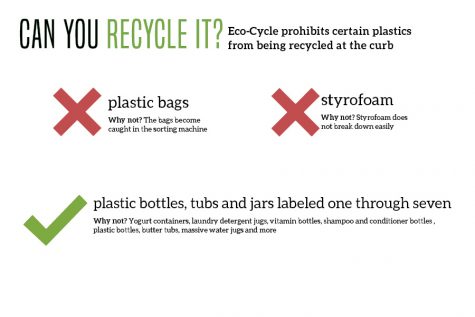 “We figured it out one time on how much it saves in terms of a whole year’s worth of paper, and it’s significant,” Thomas said. “You figure if you take a test, and that test requires say six sheets of paper, and you have 50 students, that’s 300 sheets. That’s just one subject, so if you do that regularly, you’re saving an entire ream of paper.
“We figured it out one time on how much it saves in terms of a whole year’s worth of paper, and it’s significant,” Thomas said. “You figure if you take a test, and that test requires say six sheets of paper, and you have 50 students, that’s 300 sheets. That’s just one subject, so if you do that regularly, you’re saving an entire ream of paper.
Most students, however, are not using 300 sheets of paper by themselves. Still, reducing our impact can be easy as well. Because of her interest in reducing negative environmental impact, junior Mary Kate Stoneburner remains conscious of her wastefulness and tries to cut down when she can.
“Whenever I pick up my nanny kids, I turn off my car in the car line,” Stoneburner said. “I don’t use plastic bags in stores and I don’t use styrofoam cups. I also reuse my cups and water bottles.”
Dr. Terry Loecke from the Environmental Studies program at the University of Kansas thinks that although common methods of waste reduction are important, simply going outside can also improve how people impact the environment.
“Feeding student curiosity of how the natural world works is extremely important, yet difficult to do from within a classroom,” Loecke said via email. “As a society, [we] simply need to get outside more and experience the natural world.”
In the eyes of social studies teacher Jeff Strickland, learning about the environment is the path to improving it.
“Just be informed,” Strickland said. “[Students] can sift through the minutia of garbage that’s out there that doesn’t matter. Try to learn about something every other day.”
For Stoneburner, protecting the environment is an important cause and she believes other people should take it more seriously.
“The environment is our home and we only get one Earth,” Stoneburner said, “so take care of it while you have it.”
